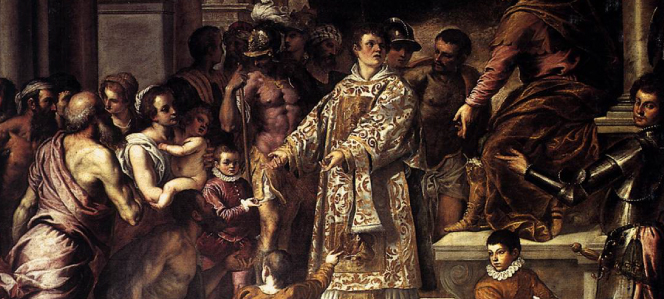Today the Church celebrates the witness of Saint Lawrence, who was brutally tortured and killed because he would not renounce his Christian faith when commanded to do so during the reign of the Roman emperor, Valerian.
Tales are frequently told of St. Lawrence’s composure and wit, elements of his character that did not fail him even while he was under extreme duress. One such story, which details his response to being literally grilled by his executioners, provokes amazement and laughter to this day. As that tale has been shared so often, I will save it for another day.
However, I will call to mind the story that is told of St. Lawrence’s arrest.
After the arrest and imprisonment of the pope and many of the priests of Rome, Lawrence, a deacon, was summoned before a magistrate and ordered to turn over to him, in the stern judge’s words “the treasures of the Church.” Lawrence, interpreting the magistrate’s words with utmost seriousness, gatherered together the impoverished, the disabled, the widowed, the orphaned, the sick, and the elderly, and brought them before the court. The magistrate, enraged by the commotion, demanded that Lawrence explain himself, to which the deacon replied: “Sir, I have provided you with precisely what you have asked for.” And then motioning towards the people he had gathered, Lawrence exclaimed, “These are the treasures of the Church.”
The lesson?
There is a worldly impression that, because of the apparent wealth of the Church and the vast cultural riches in art and architecture that the Church has accumulated over time, the Church values, more than anything else, the worldly goods that show forth her culture and the resources she uses to accomplish her mission. (Critics are not convinced that the Church as a human society and a living culture must make use of real resources, nor do they believe that the majority of the Church’s material goods are given over to serving real human need.) However, as important as these things are, they do not in actual fact constitute what the Church values most in the world. The treasures of the Church are those successors to that band of the poor and afflicted that St. Lawrence gathered before a Roman magistrate centuries ago. The poor, as the privileged bearers of Christ’s presence in the world, are our greatest treasure. Serving them, loving them, we Christians truly believe that we are serving and loving Christ.
Christians cannot delegate to others their responsibility to serve and love Christ’s beloved poor. The Church’s mission on behalf of the poor cannot be viewed as the exclusive concern of distant government bureacracies or even religious organizations. All the baptized have a role to enact inasmuch as being a Christian means that you offer yourself in loving service to the Lord—not in the abstract but in the particular. The 25th chapter of Matthew’s Gospel presses upon every Christian with enormous gravity: as often as we did it, as we do it, for others—“you did it to me.”
But what should one do? So many are in need! Christ seems everywhere to be hungry, naked, imprisoned, and sick!
The answer to this challenge seems to be found in a careful consideration of the corporal and spiritual works of mercy. Use these as a guide, and discern through them where the suffering Body of Christ might be served and how the Man of Sorrows is making himself known. And pray that, when the moment comes and you are called to bring forward the treasures of the Church, you know as well as St. Lawrence did where precisely those treasures are to be found.
